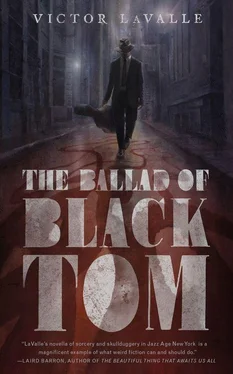“Your name,” said Malone. “I know I’ve heard it before.”
The woman, startled, looked at him and pulled back into the doorway. She reached out in a motion too quick for either man to track. She slipped the sheet of parchment paper from between Mr. Howard’s fingers quick.
Mr. Howard turned to her, and in one motion, grabbed the handle of the revolver he wore on his shoulder. The envelope fell from his hand, and the money scattered across the front steps. A breeze carried some of the bills across the house’s lawn. Mr. Howard scurried after the cash. Malone and Ma Att were alone at the threshold.
“It’s an Egyptian name, isn’t it?” Malone said. “From what I understood, the woman with that name lived in Karnak.”
“Oh?” she said. “And how much do you think you truly understand?”
“Not enough,” Malone admitted.
The old woman nodded as if pleased by his answer, the deference in it.
“What is that book?” he asked, so quietly he couldn’t be sure he spoke aloud.
“The Supreme Alphabet,” Ma Att said.
“Now you have every page,” Malone said.
“Come inside my home,” Ma Att cooed. “I’ll show you all the things I can spell with a little spilled blood.”
Malone shuffled backward to the sidewalk. He never turned away from Ma Att. He never blinked. She laughed once and slammed her door. He found Mr. Howard on his knees in the grass counting his money. Malone ran off — actually sprinted — back to Brooklyn, back to his precinct. Mr. Howard shouted something, but Malone didn’t listen, couldn’t hear over the sound of his own panicked breathing.
Malone never expected he’d return to Ma Att’s home again, but he was wrong. He’d be back one more time, but by then it would be too late.
The Suydam case came to a close, at least for those litigious relatives. A court date was set and Suydam appeared before the judge, acting as his own legal counsel. The lawyers of the extended family argued that Suydam had become erratic and senile, but Suydam explained he’d become engrossed in his education, the learning a man disdains in his twenties but yearns for in his sixties. There’s no better student than one who’s reached retirement age. The judge, a man in his sixties, found this suggestion flattering and true.
As secondary proof of Suydam’s decline, the family’s lawyers brought affidavits from ten of his neighbors in Flatbush proclaiming the odd hours, and odder characters, coming in and out of Suydam’s mansion. One night, it was attested, he’d entertained a swarthy army in his home. But Suydam explained this away as well. His learning had been in the fields of religion and myth, and New York offered the rare bounty of citizens from fifty different nations — a hundred backward tribes — many recent arrivals to the United States. Who better to interview about the beliefs of their people? He wasn’t a madman, but an amateur anthropologist. If he was too old to travel the world anymore, well, New York brought the world to him.
Malone attended the trial each day, and when Suydam explained his esoteric interests, he felt affection for the old man. In the entire courtroom, Malone felt sure, only Suydam contained a soul as sensitive as his own, as aware of the greater mysteries.
In the end, the judge admitted Suydam’s actions, and his company, might give any member of discreet society pause, but that hardly constituted reason to have the man committed to a hospital or stripped of his means. Suydam won out the day, sent his family, and their lawyers, slinking. Mr. Howard had been in the courtroom to offer testimony, but once the case was decided, the family no longer needed him. He made plans to return to Texas. He and Malone shared no tearful good-byes. A handshake was all, and good riddance. Malone’s superiors returned him to regular duties in Brooklyn, and it was this return to his usual routine that, oddly, brought Malone back into contact with Robert Suydam. It had to, with Malone’s work on the illegal-immigrant beat.
The legal immigrants of Europe — German and English, Scottish and Italian, Jewish, French, Irish, Scandinavian — all were welcomed through the immigration center on Ellis Island. A number of Chinese were permitted through this channel as well. But what about the rest? Malone’s beat in Brooklyn brought him through neighborhoods thick with Syrians and Persians, Africans, too. How did they arrive in Brooklyn in such hordes? There were other, less famous ports for such immigrants, of course, but there was also a third channel, the illegal routes known only to human smugglers. Malone was concerned with this third path. It was his job, in fact. His superiors had him on the illegal-immigrant beat before Suydam’s case and returned him to it afterward. Of the police working at the Butler Street station — perhaps of all the cops in New York City — Malone might’ve been the sole one who didn’t loathe the role. The Negro, Charles Thomas Tester, had been right when he spied Malone’s notebook — all those symbols and sigils — and counted him as a seeker of secrets. What better place to unearth them than the foreigner-filled warrens of Red Hook?
So Malone returned to the neighborhood. He’d missed the place. He doubted there was another white man on earth who would ever think the same. Robert Suydam, perhaps. These people, their superstitions and lowly faiths, were the lead a higher mind might transmute into the pure gold of cosmogonic wisdom. When Malone strolled the streets of Red Hook, he often found himself the one white man in the whole neighborhood. They were used to him there, and in this way, he became invisible. They spoke freely around him, if not always to him, and Malone’s notepad filled with their lore. The denizens knew he was an NYPD detective as well, which brought him protection on even the grimmest block.
He also ignored petty crime. He never rousted the boys smoking fragrant cigarettes; he expended no energy breaking up the rooms where bootleg liquor was sold; why would it matter to him if the men and women in those rooms risked blindness, or death, for inebriation? There were police squads keeping an eye on such activity. Raids came if a local political office was up for auction, and even then, after a few photos and the exchange of many dollars, the criminals were set free. In this way Red Hook ran efficiently, its crimes quarantined — this was all society demanded of such neighborhoods.
After a week back on patrol, Malone making conversation where he could, sitting quietly in diners, eavesdropping on adjacent booths, he heard one name repeated more and more often. Robert Suydam.
Soon enough, Robert Suydam became the sole topic of conversation in the diners of Red Hook, heard from the clusters of clove-scented young men on street corners. Even the women who leaned out tenement windows and spoke to each other across streets and alleyways were invoking the name. Within weeks it seemed as if all of Red Hook were speaking with one voice, repeating a single surname, chanting it.
Suydam. Suydam. Suydam.
Malone took the initiative to travel out to Flatbush. A pleasant morning for travel, and a short walk to the Suydam mansion. Malone entered the grounds and climbed the porch steps; he knocked for a time, but no one came. He traveled the perimeter of the home trying to spot a light, an open window, some sign of Suydam. But the mansion had an air of abandonment, a body after the loss of its soul.
Finally Malone found the windows of the great library. Though tall, Malone still had to stretch to peek in. The shelves of the library — every one — sat empty. Nothing in the room save a single great chair, turned so its back faced Malone. His arms strained, pulling himself higher onto the ledge. In the shadow of the chair, on the floor, he saw a pair of shoes. At least he thought he did. Someone sitting there. Or propped up? Malone grunted like some beast, at the exertion of holding himself up. His arms trembling, his back tight. A shadow or the heels of a man’s shoes? He wanted to tap the glass, but he needed both hands to balance. Then the shoes shifted slightly, as if the person in the chair — was someone really there? — was bracing to stand up. Malone throat closed up. He strained but held on. Now the chair in the room jostled — he was sure of it. The body in the chair was rising. Malone threw his elbow on the ledge. How could Robert Suydam not have heard Malone at the window? What proof did he have that it was Robert Suydam at all? Malone heard a man’s voice — or really more of a vibration — rippling through the thick panes of glass. Malone couldn’t decipher the words but sensed a mounting rhythm. An incantation.
Читать дальше












